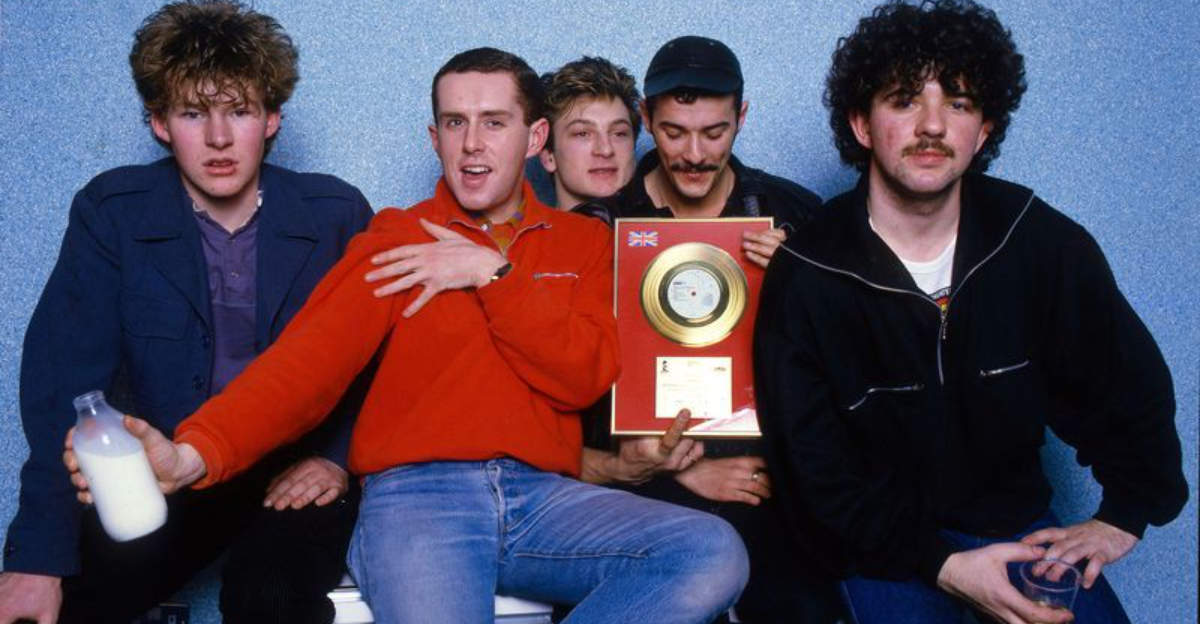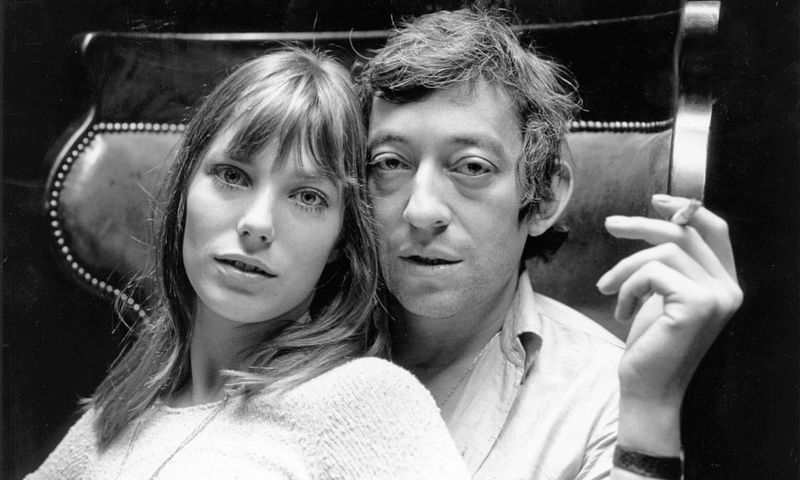15 Love Songs That Were Too Controversial To Play On The AM Radio

Remember those steamy love songs that made your parents nervously lunge for the radio dial whenever they came on? Back in the day, especially during the heyday of AM radio, stations followed strict content standards, carefully policing what could and couldn’t hit the airwaves.
As a kid growing up in the ’80s, I spent hours listening to my dad’s old records, soaking in the soulful melodies and passionate lyrics. But I was floored when I later discovered that some of my favorite tracks were once banned or heavily censored for being “too hot” for public consumption.
Whether it was because of sultry innuendos, bold political undertones, or just plain attitude, these 15 unforgettable love songs crossed invisible lines that broadcasters wouldn’t dare touch—at least, not without blushing. Turns out, rebellion never sounded so smooth.
1. “Je t’aime… moi non plus” by Serge Gainsbourg and Jane Birkin

Holy smokes, this French duet from 1969 practically invented musical controversy! The first time I heard those breathy vocals and suggestive moans, I nearly fell off my chair. My French teacher conveniently skipped translating certain parts when I asked about it in high school.
The song features actual sounds of pleasure between Gainsbourg and Birkin, with lyrics about the contradictory nature of love. Banned by the BBC and numerous radio stations worldwide, it still managed to hit #1 in the UK despite (or because of) the scandal.
The Vatican even officially condemned it! Yet beneath the controversy lies a genuinely beautiful melody that captures the paradox of physical intimacy—as Gainsbourg sings, “I love you… me neither.”
2. “Love to Love You Baby” by Donna Summer

Disco queen Donna Summer’s 1975 breakthrough hit made censors sweat more than dancers on the floor! My aunt once told me this was the first song that got her kicked out of a slumber party when someone’s mom heard it playing.
Summer’s producer Giorgio Moroder convinced her to record this 17-minute opus featuring over 20 simulated orgasms. Radio stations received a shortened version, but even that was too spicy for AM airwaves. The sensual moaning and provocative lyrics like “do it to me again and again” ensured it would only play after dark on FM stations.
Despite the controversy, the song revolutionized dance music and helped launch the disco era, proving that forbidden fruit often tastes the sweetest.
3. “Relax” by Frankie Goes to Hollywood

Talk about a career-making controversy! I first discovered this 1983 banger on a “Banned Songs” compilation tape my rebellious cousin gave me for Christmas. The look on my mom’s face when she heard the lyrics was priceless!
BBC Radio 1 DJ Mike Read famously stopped this track mid-broadcast after realizing what “when you want to come” actually meant. The ban catapulted the song to #1 in the UK for five weeks. Producer Trevor Horn created an infectious dance track, but it was the explicitly sexual lyrics about controlling orgasm that made AM radio run for cover.
The music video featuring a gay leather bar didn’t help matters either. Ironically, the controversy helped Frankie Goes to Hollywood become one of the biggest acts of the 80s.
4. “Pillow Talk” by Sylvia

Before becoming a sultry R&B hit in 1973, Sylvia Robinson actually wrote this bedroom anthem for Al Green! When he rejected it for religious reasons, she recorded it herself, creating what I consider the steamiest slow jam of the decade.
The song features Sylvia’s sensual whispers, moans, and cooing sounds over a hypnotic groove. Lines like “Ooh, I love the way you touch me” and breathless vocalizations were far too explicit for conservative AM radio programmers. What makes this particularly interesting is that Sylvia later co-founded Sugar Hill Records, helping birth commercial hip-hop!
Despite limited airplay, “Pillow Talk” still reached #3 on Billboard’s Hot 100, proving that sometimes, what happens in the bedroom doesn’t always stay there.
5. “Tonight’s the Night” by Rod Stewart

Rod Stewart’s 1976 chart-topper shocked me when I finally paid attention to the lyrics at age 15. My dad had been playing it for years, and I suddenly realized it was basically a seduction manual!
The song explicitly describes a man persuading a virgin to have sex for the first time with lines like “Spread your wings and let me come inside.” AM radio stations either banned it outright or played heavily edited versions. The female voice whispering in French at the end adds another layer of sensuality that pushed boundaries even further.
Despite (or because of) the controversy, it became Stewart’s biggest hit, spending eight weeks at #1. Funny how a song too risqué for radio became a staple at wedding receptions—I guess nobody listens to the lyrics!
6. “Physical” by Olivia Newton-John

Goodbye Sandra Dee, hello sexual revolution! Olivia Newton-John’s transformation from wholesome country singer to spandex-clad vixen left my jaw on the floor. At our 8th grade dance, the teacher actually unplugged the stereo when this came on!
Released in 1981, “Physical” was banned by several radio stations for its unambiguous references to sex. The chorus leaves little to the imagination: “Let’s get physical, physical, I wanna get physical, let’s get into physical.” Newton-John later admitted she was initially horrified by the lyrics but decided to record it anyway.
The music video tried to create a humorous gym workout theme to soften the blow, but nobody was fooled. Despite limited AM radio play, it spent 10 weeks at #1, becoming the biggest hit of the 1980s’ first half.
7. “Let’s Spend the Night Together” by The Rolling Stones

The Stones were no strangers to controversy, but this 1967 hit pushed even their boundaries! My uncle claims he was at the infamous Ed Sullivan Show taping where Mick Jagger was forced to change the lyrics to “let’s spend some time together.” The eye-roll Jagger gave the camera became rock legend!
AM radio stations faced a dilemma—the biggest band in the world had released a song explicitly inviting a woman to spend the night. Many stations either banned it entirely or played the edited version. The BBC refused to announce the title when it was on the charts.
What’s fascinating is how tame it seems today compared to modern music. The song’s straightforward proposition—”I’ll satisfy your every need”—feels almost quaint now, but in 1967, it was revolutionary enough to scandalize a generation.
8. “Love to Love You” by Foxy

Disco had a way of sneaking sexy content past censors, but Foxy’s 1978 funk masterpiece was too obvious to ignore! I discovered this gem while digging through vinyl at a flea market, and the seller winked at me when I bought it—now I understand why!
The female vocalist’s passionate moans and cries throughout the song left nothing to the imagination. Lines like “I want to feel you deep inside” were explicit even by disco standards. Most AM stations refused to play it, though it found a home in nightclubs and on late-night FM radio.
What makes this track special is how the Latin-infused funk groove perfectly complements the sensual vocals. Despite limited airplay, it reached #9 on the R&B charts, proving that word-of-mouth can sometimes be more powerful than radio promotion.
9. “Darling Nikki” by Prince

Prince’s purple reign over provocative music reached its zenith with this 1984 shocker! I nearly choked on my cereal when my older sister explained what “masturbating with a magazine” meant after I innocently sang along to this tune.
Featured on the “Purple Rain” soundtrack, “Darling Nikki” describes meeting a sexually adventurous woman in a hotel lobby. The explicit descriptions of Nikki’s sexual activities were far too graphic for AM radio, which refused to play it despite the album’s massive success.
This song famously inspired Tipper Gore to form the Parents Music Resource Center after her young daughter heard it. The resulting “Parental Advisory” labels on albums became Prince’s unintended legacy to music censorship. Despite never being released as a single, it remains one of his most notorious and discussed tracks.
10. “Afternoon Delight” by Starland Vocal Band

Would you believe this innocent-sounding 1976 hit about afternoon lovemaking won a Grammy? I had a good laugh when my parents reminisced about how this song played at their high school prom while teachers remained clueless about its meaning!
The cheerful harmonies and seemingly wholesome delivery disguised lyrics about midday sexual encounters. Lines like “rubbin’ sticks and stones together makes the sparks ignite” weren’t exactly subtle metaphors. Many AM stations initially played it without realizing the content, then quietly removed it once complaints started rolling in.
The song’s title comes from a happy hour menu at a Washington D.C. restaurant, giving new meaning to “appetizers.” Despite limited airplay after its true meaning spread, it reached #1 on the Billboard Hot 100, proving that America loves a good euphemism.
11. “Sexual Healing” by Marvin Gaye

Marvin Gaye created the ultimate musical aphrodisiac with his 1982 comeback hit! During college, my roommate played this on repeat whenever his girlfriend visited—the rest of us knew to make ourselves scarce.
After years of political and socially conscious music, Gaye returned with an unabashedly sensual slow jam. The explicit lyrics about sexual therapy being “good for me” and pleading “don’t procrastinate, it’s not good to masturbate” were too direct for AM radio’s comfort. Most stations played heavily edited versions or relegated it to evening hours.
The irony? Despite its explicit content, the song has been used in countless medical studies proving music’s therapeutic effects. Gaye’s silky vocals over that distinctive drum machine created something so authentically intimate that even conservative listeners couldn’t resist its charms—they just wouldn’t admit to enjoying it!
12. “Justify My Love” by Madonna

Madonna’s 1990 erotic odyssey wasn’t just banned from radio—MTV wouldn’t touch it either! I still remember the playground buzz when kids claimed their older siblings had the forbidden VHS single hidden somewhere at home.
The breathy spoken-word delivery over a hypnotic beat pushed sexual boundaries with lines about “poor is the man whose pleasures depend on the permission of another.” The song explores taboo fantasies, voyeurism, and sexual freedom in ways AM radio couldn’t handle. The accompanying video featuring bisexuality, sadomasochism, and gender-bending was even more controversial.
Madonna brilliantly turned the ban into a marketing opportunity, releasing it as the first-ever “video single” for purchase. The strategy worked—it hit #1 despite minimal radio support. Once again, the Material Girl proved that in the attention economy, there’s no such thing as bad publicity.
13. “Crash Into Me” by Dave Matthews Band

Not all controversial love songs are obvious about their intentions! I happily sang along to this 1996 hit for years before a friend pointed out I was essentially belting out a voyeur’s anthem at karaoke night.
Beneath the romantic-sounding melody lies a story about a man watching a woman through her window. Lines like “hike up your skirt a little more and show the world to me” reveal the song’s voyeuristic nature. Many AM stations played it without realizing the content, while others recognized the stalker-ish undertones and limited its airplay.
Dave Matthews himself has acknowledged the creepy elements, calling it “a peeping Tom song.” Yet somehow its gentle acoustic arrangement and Matthews’ earnest delivery made it a wedding favorite—proof that a pretty melody can disguise almost any message!
14. “I Want Your Sex” by George Michael

George Michael’s post-Wham! declaration of independence left censors clutching their pearls in 1987! My first boyfriend made me a mixtape with this as the opening track—subtle he was not.
The title alone guaranteed limited radio play, but lyrics promoting monogamous sex like “sex is natural, sex is fun, sex is best when it’s one on one” were revolutionary during the AIDS crisis. Many stations refused to play it entirely, while others aired it only late at night. BBC Radio 1 would only refer to it as “I Want Your Love.”
Michael cleverly wrote “Explore Monogamy” on his partner’s body in the music video to emphasize his responsible message. Despite the controversy, it reached #2 in the US and UK, establishing Michael as a solo star and proving that sometimes, saying the quiet part out loud can be both controversial and commercially successful.
15. “Erotic City” by Prince

Lightning struck twice when Prince released this funky B-side in 1984! I once accidentally played this at a family gathering, thinking it was the radio-friendly “Let’s Go Crazy”—talk about an awkward moment!
Originally the flip side to the “Let’s Go Crazy” single, “Erotic City” contains over 20 instances of what sure sounds like the F-word, though Prince later claimed he was saying “funk.” The song’s explicit sexuality and repeated phrase “we can funk until the dawn” (or was it?) made it impossible for AM radio to touch.
Despite zero radio play, club DJs made it a dance floor staple, and it became one of Prince’s most beloved non-album tracks. The song’s blend of funk, psychedelia, and explicit content created a blueprint for underground dance music that artists still follow today.
